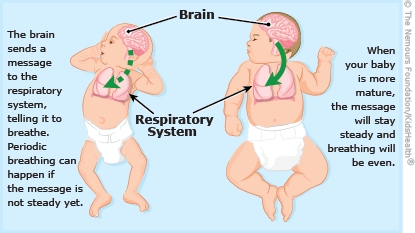Periodic breathing is a normal breathing pattern seen in some babies. The baby pauses breathing for 5–10 seconds; takes a few rapid, shallow breaths; then has regular, even breathing. This pattern may repeat several times. It usually happens while a baby is sleeping and is most common in premature babies (babies born early). It doesn't mean anything is wrong, and it doesn't cause problems. As a baby matures, episodes of periodic breathing become less frequent and usually go away completely by around 6 months of age.




Pauses in your baby's breathing last longer than 15 seconds.
Call 911 if your baby is blue, stops breathing, or struggles to breathe.
If you think your baby isn't well and you can't get in touch with your health care provider, take your baby to get medical help right away. This includes if your baby:

Is periodic breathing the same as apnea? Periodic breathing is different from apnea, which is a pause in breathing that lasts longer (more than 20 seconds) without the pattern of fast breathing after it. Apnea needs special treatment, but periodic breathing doesn't and will go away on its own.